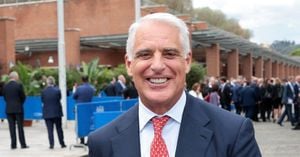French President Emmanuel Macron has made headlines recently by officially recognizing the killing of West African soldiers by the French Army during World War II as a massacre. This historic acknowledgment, delivered via letter to Senegalese officials, marks the first time any French leader has made such recognition of the events surrounding the killings, which occurred on December 1, 1944, near the village of Thiaroye, close to Dakar.
The incident involved between 35 and 400 West African soldiers, known as the Tirailleurs Sénégalais, who were co-opted by the French military during World War II. After fighting for France during the battles of France, they were tragically killed by French forces following what was described as a mutiny over unpaid wages. The soldiers, many of whom were unarmed at the time, succumbed to gunfire from their own commanders after voicing their frustration over the nonpayment of their salaries and other grievances.
Macron's letter was delivered just before the 80th anniversary of the Thiaroye massacre, highlighting its importance and the enduring impact of colonial history between France and its former African colonies. This recognition isn't happening in isolation; it coincides with growing calls within Senegal for clarity and acknowledgment of past atrocities committed during the colonial period.
Senegalese President Bassirou Diomaye Faye publicly welcomed Macron's acknowledgment, expressing hope it would facilitate the full exploration of the tragic events of Thiaroye. Speaking to the media, Faye stated, "We have long sought closure on this story and we believe this time France's commitment will be full, frank and collaborative." He emphasized the importance of transparency and accountability from France concerning the historical facts surrounding the incident.
Macron's letter also called for the establishment of the 'Committee for the Restoration of the Facts,' which will work under the guidance of Professor Mamadou Diouf, who is recognized for his expertise and integrity. The committee's primary mission is to investigate the historical truth surrounding the massacre and work toward deepening the mutual acknowledgment of the past between France and Senegal.
Leaders from various sectors within Senegal see Macron's statement as not just a step toward recognizing past injustices but also as part of more extensive discussions about the historical ties and current relations between France and its former colonies. France has faced increasing scrutiny and demands for reparations and formal acknowledgments of wrongdoings throughout its colonial history.
Following the recent Senegalese legislative elections, where President Faye's party secured a majority, there is renewed momentum to pursue bold reforms aimed at achieving greater economic independence from foreign companies, particularly French firms heavily embedded within Senegal's economy. This political backdrop adds weight to Macron's letter, as Senegal navigates its identity and sovereignty away from the vestiges of colonial history.
Macron's recognition of the massacre also arrives amid rising anti-French sentiment across Africa as France's influence has waned over recent years. The acknowledgment can be interpreted as part of Macron's broader efforts to mend ties with African nations and rectify historical grievances, as many nations reconsider their relationships with former colonial powers.
Despite the formal recognition of the massacre, concerns linger over the continued presence of French military personnel in Senegal. Currently, approximately 350 French troops remain stationed there, primarily for supportive operations. President Faye hinted at potential shifts in military collaboration, alluding to the historical narratives of colonization and oppression, and emphasized the importance of considering how foreign military presences are perceived today.
The Thiaroye massacre is not just a recollection of violence but serves as a symbol of the long and complicated history of France's colonial practices and the aftermath faced by African nations. Macron's acknowledgment opens the door for significant discussions surrounding reparations, recognition of past wrongs, and the future of France's relationship with Senegal and the broader West African region.
Faye has made it clear he desires France's commitment to not only recognize the events but actively participate in subsequent discussions about reparative justice and the long-term effects of colonial actions. The event also symbolizes the changing dynamics of international relations, particularly as countries redefine their narratives and histories.
Overall, Macron's recognition of the Thiaroye massacre stands as a significant step toward healing historical wounds. It forms part of the broader conversation on colonial legacy, accountability, and the pathways to reconciliation and cooperation with France's former colonies.



